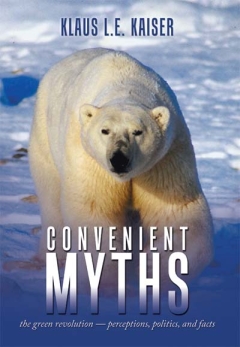|
|
CONVENIENT MYTHS
the
green revolution —
perceptions, politics, and
facts |
 |
by Klaus L.E. Kaiser, is the first clearly written, comprehensive
book looking at the green desires and expectations and juxtaposing
these with the physical and chemical facts and realities.
CONVENIENT MYTHS explains in common terms why many of these
green ideas will remain myths and dreams. The laws of nature cannot
be broken. No matter how much we may desire the opposite.
Keywords / Chapters:
|
Climate change, global warming, IPCC, government, media, propaganda, deficit, inflation, earthquakes, volcanos,
pollution, ice ages, greenhouse gases, carbon dioxide, methane, water vapor, sea ice, Arctic, polar bears, seals, whales,
energy, temperature, cod, salmon, El Nino, hurricanes, typhoons, earth, freshwater, deforestation, physics, chemistry, biology,
freshwater, aquifers, desalination, disinfection, fluoridation, air, ozone, smog, acid rain, crude oil, coal, natural gas, electric power,
electric cars, fossil fuels, natural gas, nuclear, geothermal, heat pump, wave power, osmosis, wind, solar energy, biofuels, ethanol, engine,
hybrid, hydrogen, light, food, organic, genetically modified, fish, contaminants, sun, radiation, light, X-rays,
weather, droughts, floods, diseases, longevity, cancer, Alzheimer's, malaria, progress |
|
Why CONVENIENT MYTHS ?
CONVENIENT MYTHS deals with a wide variety of subjects. They range from the
role of governments and that of the media, from climate to weather, from power
generation to power use, from steam engines to electric cars, from the
environment to health, to name a few.
All these issues are linked by the laws of nature. As a scientist, I feel that
every citizen in the modern world needs to know the basic facts and how they
affect our daily life, or how they determine what may physically and
technologically be possible or not.
One of the prerequisites for understanding the connections and consequences of
these issues are common definitions. Vague terms, such as pollution, emissions,
clean energy, sustainability and the like are useless if they are not defined
in a clear and understandable way. The daily barrage of news propagated by the
media often lacks this commonality of the meaning and definition of such terms.
No wonder, misconceptions arise, conclusions diverge, and the actions based on
such by different societies and other entities can be diametrically opposed to
each other with respect to the same specific issue.
Precisely such confusion gave me the impetus for this work. It is my hope
that it will help to bring clarification to some of the important issues
of today and the future.
|
|
|



